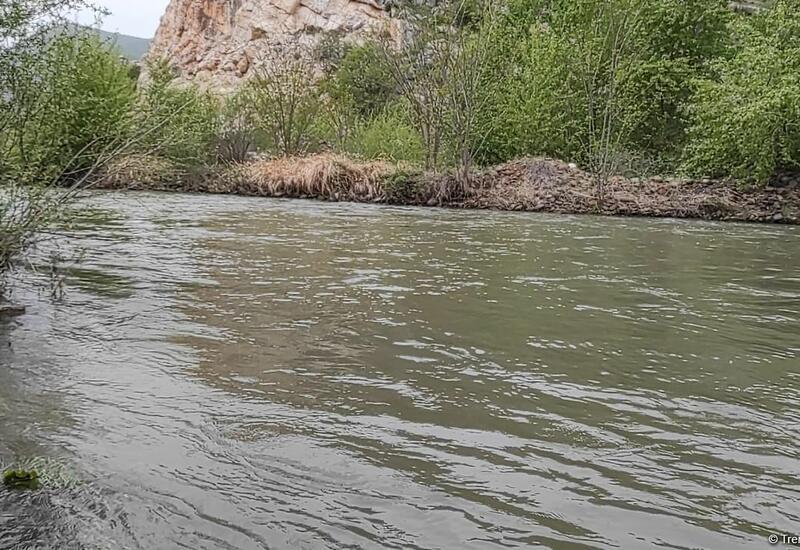Int'l community urged to help stop Okhchuchay River pollution

By Sabina Mammadli
Azerbaijani Ecology and Natural Resources Minister Mukhtar Babayev has called on international organizations and forum participants to provide support in preventing pollution of the Okhchuchay River.
He made the remarks at the 4th Asia-Pacific Water Forum in Japan dedicated to improving water management, held in the Japanese city of Kumamoto, joining it online.
The forum was attended by heads of state, government representatives of a number of countries, leading international organizations, local media has reported.
He noted that the Okhchuchay River is heavily polluted as a result of the activities of the mining industry in Armenia.
The minister stressed the importance of cooperation with neighboring countries, as well as international organizations in the field of transboundary river management.
The Okhchuchay River, an 83-km left tributary of the Araz River, has a basin area of 1,175 square kilometers. The river begins on the Zangazur ridge's Gapidzhig mountain (3,285 meters).
The river flows through liberated Zangilan into the Araz River, with the majority of it located in Armenia's Syunik region (Azerbaijan's historical Zangazur region).
Because of transboundary water flows, approximately 70 percent of Azerbaijan's groundwater resources are formed in neighboring countries. The transboundary river Okhchuchay, which serves as a collector of industrial waste in Armenia, is constantly polluted by waste from the Gafan and Gajaran mining industries.
These industrial wastewaters are discharged into the river untreated, which occasionally increases the level of pollution. As a result, these water resources are deemed unfit for use on Azerbaijani territory. Furthermore, Okhchuchay flows into Araz, the second largest river in the South Caucasus, and pollution has a direct impact on its quality and water reserves.
Azerbaijan had previously urged responsible companies to halt operations at the Zangazur copper-molybdenum plant in Armenia's Syunik region due to the environmental disaster caused by the latter.
It should be noted that the plant's main shareholder is Germany's Cronimet Mining Company, which massively pollutes the transboundary Okhchuchay River.
On April 12, President Ilham Aliyev stated at a meeting dedicated to the results of the first quarter of 2022 that a special report on Armenia's environmental terror against Azerbaijan was prepared and adopted a few years ago by the Parliamentary Assembly of the Council of Europe.
He stated that the rivers in Azerbaijan’s Karabakh were occupied and mercilessly exploited by Armenians.
“The catastrophe of the Okhchuchay River is before the eyes of the world now. We have raised this issue,” he said.
Noting that when he raised the issue, Azerbaijan was promised that the company responsible for the disaster would come and clean it up, he emphasized that a year has passed and no proposals have been received.
“Cronimet is the company that contaminated the Okhchuchay River. It is a large company, and according to some foreign media, it had an illegal business relationship with representatives of Serzhik Sarkisyan’s former junta regime using corruption schemes. Together they operated the copper plant there,” he said.
Aliyev noted that the preparations for a legal claim in this regard with the involvement of international experts are underway.
Armenia’s three-decade occupation of Azerbaijani territories extensively damaged the ecosystem, wildlife and natural resources in and around the Nagorno-Karabakh region. Armenians also resorted to large-scale acts of ecological terror in regions they had to leave under the trilateral November peace deal that stipulated the return of Azerbaijan’s occupied territories.
The clashes between Armenia and Azerbaijan escalated for the second time in 2020 after Armenia's forces deployed in the occupied Azerbaijani lands targeted Azerbaijani civilian settlements and military positions, causing casualties among civilians and the military. In the early hours of September 27, Azerbaijan launched a counter-offensive operation that lasted six weeks. The operation resulted in the liberation of Azerbaijan's occupied lands.
A Russia-brokered ceasefire deal that Azerbaijan and Armenia signed on November 10, 2020, brought an end to the 44-day war between the two countries. The Azerbaijani army declared a victory against the Armenian troops. The signed agreement obliged Armenia to withdraw its troops from the Azerbaijani lands that it had occupied.
---
Here we are to serve you with news right now. It does not cost much, but worth your attention.
Choose to support open, independent, quality journalism and subscribe on a monthly basis.
By subscribing to our online newspaper, you can have full digital access to all news, analysis, and much more.
You can also follow AzerNEWS on Twitter @AzerNewsAz or Facebook @AzerNewsNewspaper
Thank you!
